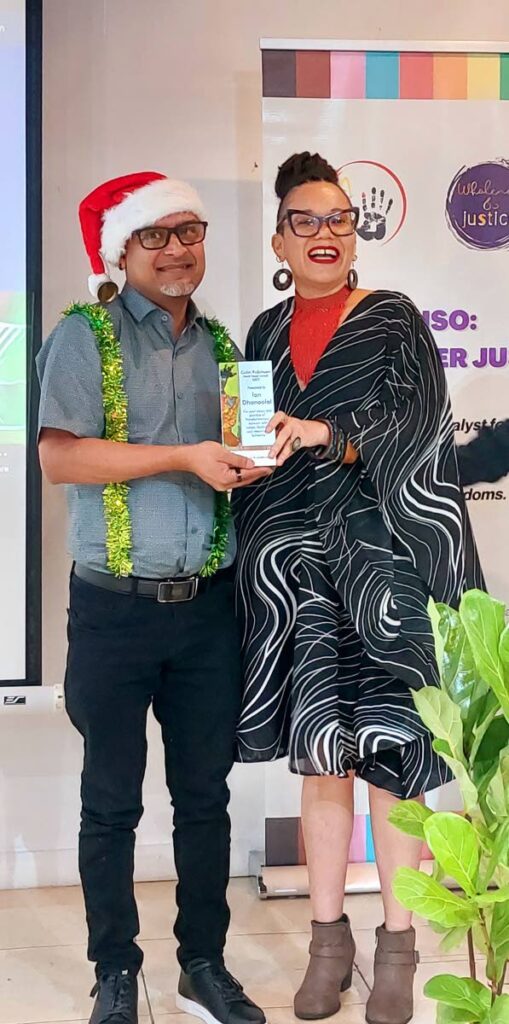Deaf activist Ian Dhanoola wins Hard Head Award

Ian Dhanoola is an activist, a researcher, a tutor and the winner of CAISO: Sex and Gender Justice’s 4th Annual Colin Robinson Hard Head Award.
The award is named after Robinson’s 2016 book of poems, You Have You Father Hard Head.
Described as a transformational leader for the deaf community, Dhanoola, 49, received the award on December 10, at ThinkArtWorkStudio, Port of Spain.
He is the founder and president of Trinidad and Tobago’s first deaf-led advocacy organisation the Deaf Empowerment and Advancement Foundation (DEAF) and one of the first deaf board members of the TT Association for the Hearing Impaired.
Sunday Newsday emailed several questions to Dhanoola, which were translated to him by a sign language interpreter. He then sent a video of his responses, which were translated into script and emailed to Newsday.
He said the award was not about himself but for the deaf community as he hoped it would encourage the members to keep fighting.
“I wanted to win so that deaf children have someone to look up to, to know that they can keep fighting and never give up on their goals. That’s what this award represents.
“I want to encourage people to support the deaf community. We need to get to work to achieve what we need, and to address the different challenges we face. We have to identify the most important areas to address such as improving the education system for deaf people, achieving equality for deaf workers and protecting the human rights of deaf people.”
Born deaf, signing was Dhanoola’s first language. He was the first deaf interpreter to work live on national television and continues to interpret the annual National Budget and Budget Debate.
He has taught TT Sign Language (TTSL) and American Sign Language (ASL) for over 15 years and has been teaching sign language and deaf culture at UWI, St Augustine since 2015.
He said ASL held great influence in the Caribbean as it was spread across the region by missionaries, churches, schools and advocates. But deaf communities in the Caribbean also have their own ways of signing to represent their own cultures, communities and countries.
Also, during the covid19 pandemic, he produced a TTSL version of Bunty and Bubbly: Covid19, which made important public health information available to deaf children in an engaging and entertaining way.
In the Judges’ Citation at the ceremony, one of the three judges, journalist and media consultant Franka Phillip said, “His tireless work in documenting Caribbean sign languages and, in particular, the signing and experiences of the oldest generation of deaf people, has generated a rich digital record which can be used to safeguard endangered ways of communicating, and preserving vital stories for future generations.”
She said he built partnerships with deaf leaders and communities throughout the Caribbean and gave numerous presentations on language rights, language endangerment and gender-based violence.
He also played a key role in CAISO’s Sign Together project in which LGBTQI+ individuals and service providers were offered free TTSL tuition up to Levels four and five.
Dhanoola said the Sign Together programme highlighted the importance of language diversity and the neutrality of interpreters who were representing the members of the deaf community and not speaking for themselves.
“It’s important for people to be able to express different identities using sign languages, to understand the importance of facial expressions when signing and to understand language attitudes. The people who participated in the programme learnt about these things, and about how they can be allies.
“It’s important to develop communication within the LGBTQI+ community and with public. Many deaf LGBTQI+ people experience discrimination. We found that sometimes sign language interpreters do not want to support deaf LGBTQI+ people because they don’t accept their identities. Whether someone is part of the LGBTQI+ community or not, they must be neutral.”
Dhanoola first started advocating for the deaf community to support deaf children and their right to access communication. He said deaf people had to fight for equality and the community needed leadership to insist that the deaf were capable.
“I believe that my advocacy is important because we deaf people have a human right to self-determination. We are just as capable of leadership as hearing people. We have the same rights to work and to education. To achieve these rights we have to keep fighting, and we will eventually succeed. It doesn’t matter how long it takes, these changes must happen.”
Therefore DEAF’s main goal is to advocate for the human rights of deaf people though better policies and laws. He said access to education, including achieving English language literacy, is crucial to deaf people of all ages so they are not limited to low-paying jobs but could achieve equality in employment and have the same opportunities as hearing people.
He said DEAF members also promote deaf awareness among hearing people, provide sign language training, training for sign language interpreters and teach people how to be allies to the deaf community.
“There is still lots more work that needs to be done to improve access to information. Written texts need to be translated into TTSL so that deaf people can understand them. We need more resources for the deaf community. We need to improve sign language interpreting services and to ensure that there is better training.
“We need to make sure that deaf children have deaf role models that they can look up to so they can also be proud and successful as they grown up. So we need better access, more resources, and support in training the next generation of deaf leaders.”
He said new signs are constantly being created and there are new technologies to help improve access for deaf people but, he believes it is important for the deaf community to develop its own local resources.


Comments
"Deaf activist Ian Dhanoola wins Hard Head Award"